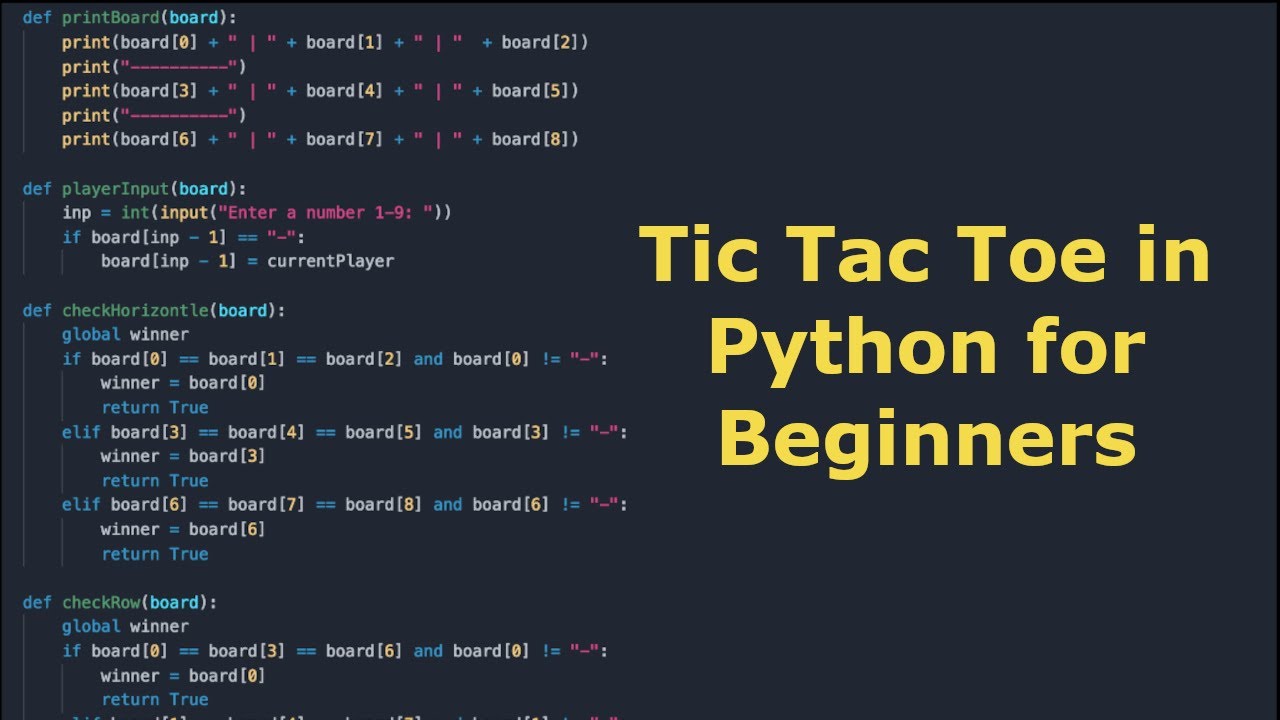Tic Tac Toe - Down the memory Lane 02
Summary
TLDRThis video tutorial guides viewers through developing a grid-based game, likely Tic-Tac-Toe, using programming concepts. It covers setting up the game board, managing user inputs, and implementing the rules for winning or drawing. The instructor emphasizes understanding the program flow and proper indentation for clarity. The tutorial aims to equip learners with the skills to check for occupied cells and determine the outcome of the game—whether a player has won or if the game ends in a draw—while preparing for more complex functionalities in subsequent videos.
Takeaways
- 😀 The script outlines the implementation of a Tic-Tac-Toe game using JavaScript.
- 🤖 Key components include defining the game board and player symbols.
- 🎮 The game logic checks for winning conditions after each move.
- 📊 Functions are created to handle game state updates and display the board.
- 🔄 The flow of the program involves alternating turns between players.
- ✅ The game can detect when all squares are filled to determine a draw.
- 🔍 The script emphasizes the importance of code readability and proper indentation.
- 🔧 Debugging strategies are mentioned to ensure smooth functionality.
- 💡 Future videos will cover how to implement winner detection mechanisms.
- 📅 The overall aim is to create a functional and engaging user experience.
Q & A
What is the main objective of the programming task discussed in the video?
-The main objective is to implement a functionality that checks for a draw condition in a game, specifically by verifying if all nine squares have been filled without a winner.
How is a draw determined in the context of the game?
-A draw is determined by checking if all nine squares are occupied and if no player has won.
What specific programming element is highlighted for checking the game state?
-The script emphasizes the need for conditional statements to assess the occupancy of the squares and the winning conditions.
What does the speaker mention about indentation in the code?
-The speaker highlights the importance of proper indentation in the code, ensuring that the structure is clear and that blocks of code are at the correct level.
Why is it important to understand the flow of the program?
-Understanding the flow of the program is crucial for effectively implementing the functionality and debugging any issues that may arise.
What will be covered in the next video according to the speaker?
-The next video will focus on how to implement the functionality that determines whether a player has won the game.
What programming logic does the speaker suggest using for checking the game status?
-The speaker suggests using logical checks to confirm the occupancy of each square and to evaluate win conditions.
What role does the variable 'nine' play in the code?
-The variable 'nine' likely represents the total number of squares to check for occupancy in the game grid.
What is implied about the testing process in the video?
-The testing process involves validating that all conditions for a draw are met before concluding the game state.
What learning outcome does the speaker aim to achieve through this tutorial?
-The speaker aims to help viewers understand how to programmatically determine the game state, specifically whether the game results in a win or a draw.
Outlines

このセクションは有料ユーザー限定です。 アクセスするには、アップグレードをお願いします。
今すぐアップグレードMindmap

このセクションは有料ユーザー限定です。 アクセスするには、アップグレードをお願いします。
今すぐアップグレードKeywords

このセクションは有料ユーザー限定です。 アクセスするには、アップグレードをお願いします。
今すぐアップグレードHighlights

このセクションは有料ユーザー限定です。 アクセスするには、アップグレードをお願いします。
今すぐアップグレードTranscripts

このセクションは有料ユーザー限定です。 アクセスするには、アップグレードをお願いします。
今すぐアップグレード関連動画をさらに表示

Python TIC TAC TOE Tutorial | Beginner Friendly Tutorial

Create Tic Tac Toe Game in MIT App Inventor in Just 10 Minutes! || Free Extension || App Inventor 2

Tic Tac Toe Game In Python | Python Project for Beginners

Java tic tac toe game ⭕

Abdominopelvic Quadrants And Regions - Abdominal Quadrants

Artificial Intelligence - 5.1 - Adversarial search and games, Game theory
5.0 / 5 (0 votes)
